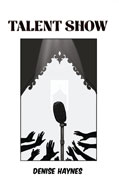
 |
A man's personal revelations and observations about a wife whom he loved and a family whose metamorphoses were an education for him are at the center from which the group's "talent show"—within the family and in larger contexts—spin. The narrator's opening lines in the book reveal his difficulty in breaking through his personal reserve, or perhaps his self-protection, and yet he feels that he must tell the story. He does so eloquently. His ability to move and change with the characters connotes true literary skill. He sensibly admits to having different connections to each of his children since each is a different person from the others. Some examples are seen in the conventions of family life (church, school, etc.), Suzy's participation in baking cakes for functions, and many other activities that are seen to take time away from the family instead of bonding it by inclusion.
The author’s text is searching and usually serious and reminds the reader of messages in other, significantly older books about family life, even those with humorous perspectives. For instance, the author’s subject makes one recall the dedication in Cheaper By the Dozen: "To Dad, who only raised twelve children and To Mother, who raised twelve only children." Another thematic example would be Father of the Bride, in which the narrating father despairs over his daughter's ability to sustain a practical role in her marriage and is surprised and somewhat sorrowful when he realizes her complex personality can be fearful at one time and confident at the next. Ultimately, Haynes’ story stands on its own merits and insightfully probes into the talents that people must practice to successfully cope with life.